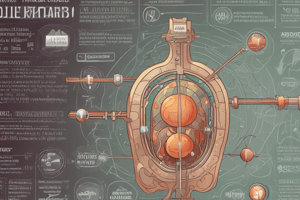Podcast
Questions and Answers
What is the main focus of pharmacology?
What is the main focus of pharmacology?
Which process is NOT part of pharmacokinetics?
Which process is NOT part of pharmacokinetics?
Why is understanding pharmacokinetics important in drug discovery and development?
Why is understanding pharmacokinetics important in drug discovery and development?
What does distribution refer to in pharmacokinetics?
What does distribution refer to in pharmacokinetics?
Signup and view all the answers
What factor can influence drug absorption into the bloodstream?
What factor can influence drug absorption into the bloodstream?
Signup and view all the answers
Which factor influences the process of drug distribution in the body?
Which factor influences the process of drug distribution in the body?
Signup and view all the answers
What is metabolism in pharmacokinetics?
What is metabolism in pharmacokinetics?
Signup and view all the answers
What is excretion in pharmacokinetics?
What is excretion in pharmacokinetics?
Signup and view all the answers
What do pharmacokinetic models help to predict?
What do pharmacokinetic models help to predict?
Signup and view all the answers
What does pharmacokinetic simulation involve?
What does pharmacokinetic simulation involve?
Signup and view all the answers
Study Notes
Pharmacology: Understanding the Science of Drugs
Pharmacology is a branch of medicine and biology that deals with the study of drug action, especially with regard to the interactions between a living organism and the chemicals that stimulate, inhibit, or otherwise modify the functions of the organism. It involves the discovery, development, and application of drugs in the treatment of diseases and prevention of diseases. This article will delve into the subtopic of pharmacology, focusing on pharmacokinetics.
Pharmacokinetics: The Study of Drug Movement
Pharmacokinetics is the study of how a drug enters the body, the path it takes through the body, and how it is metabolized and excreted. It involves processes such as absorption, distribution, metabolism, and excretion (ADME) of drugs. Pharmacokinetics plays a crucial role in drug discovery and development, as understanding these processes helps to predict a drug's effectiveness, safety, and optimal dosing.
Absorption
Absorption is the process by which a drug moves from the site of administration into the bloodstream. This can occur through various routes, such as oral administration, subcutaneous injection, intramuscular injection, or intravenous injection. Absorption is influenced by factors such as the drug's chemical properties, the formulation in which it's delivered, and the site of administration.
Distribution
Distribution refers to the movement of the drug from the bloodstream into the tissues, cells, and organs throughout the body. This process is influenced by factors such as the drug's lipid solubility, protein binding, and the specific tissues it needs to reach.
Metabolism
Metabolism is the process by which the body breaks down drugs into smaller, more soluble molecules called metabolites. This process is carried out by enzymes in the liver and other organs. Metabolism is an essential part of pharmacokinetics, as it determines the drug's effectiveness and half-life, or the time it takes for half of the drug to be eliminated from the body.
Excretion
Excretion is the process by which the body eliminates drugs and their metabolites from the body. This can occur through various routes, such as urine, feces, sweat, or exhaled air. The rate of excretion is influenced by factors such as the drug's lipid solubility, protein binding, and the specific organs responsible for excretion, such as the kidneys.
Pharmacokinetic Models and Simulation
Pharmacokinetic models are mathematical representations of the ADME process. These models help to predict drug concentration in the body over time, which is essential for understanding drug efficacy and safety. Pharmacokinetic simulations involve the use of these models to predict drug concentration in the body under various conditions, such as different dosing regimens or patient populations.
In conclusion, pharmacology is a vital field of study that encompasses the science of drugs and their interactions with the body. Pharmacokinetics, a subtopic of pharmacology, focuses on the processes of absorption, distribution, metabolism, and excretion of drugs. Understanding these processes is crucial for predicting drug efficacy, safety, and optimal dosing, which ultimately leads to the development of effective and safe treatments for various diseases.
Studying That Suits You
Use AI to generate personalized quizzes and flashcards to suit your learning preferences.
Description
Delve into the subtopic of pharmacokinetics, the study of how drugs enter the body, their movement through the body, and metabolism. Learn about absorption, distribution, metabolism, and excretion of drugs, and how pharmacokinetic models help predict drug concentration for effective treatments.




